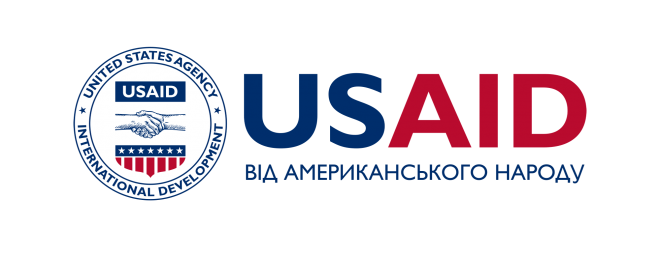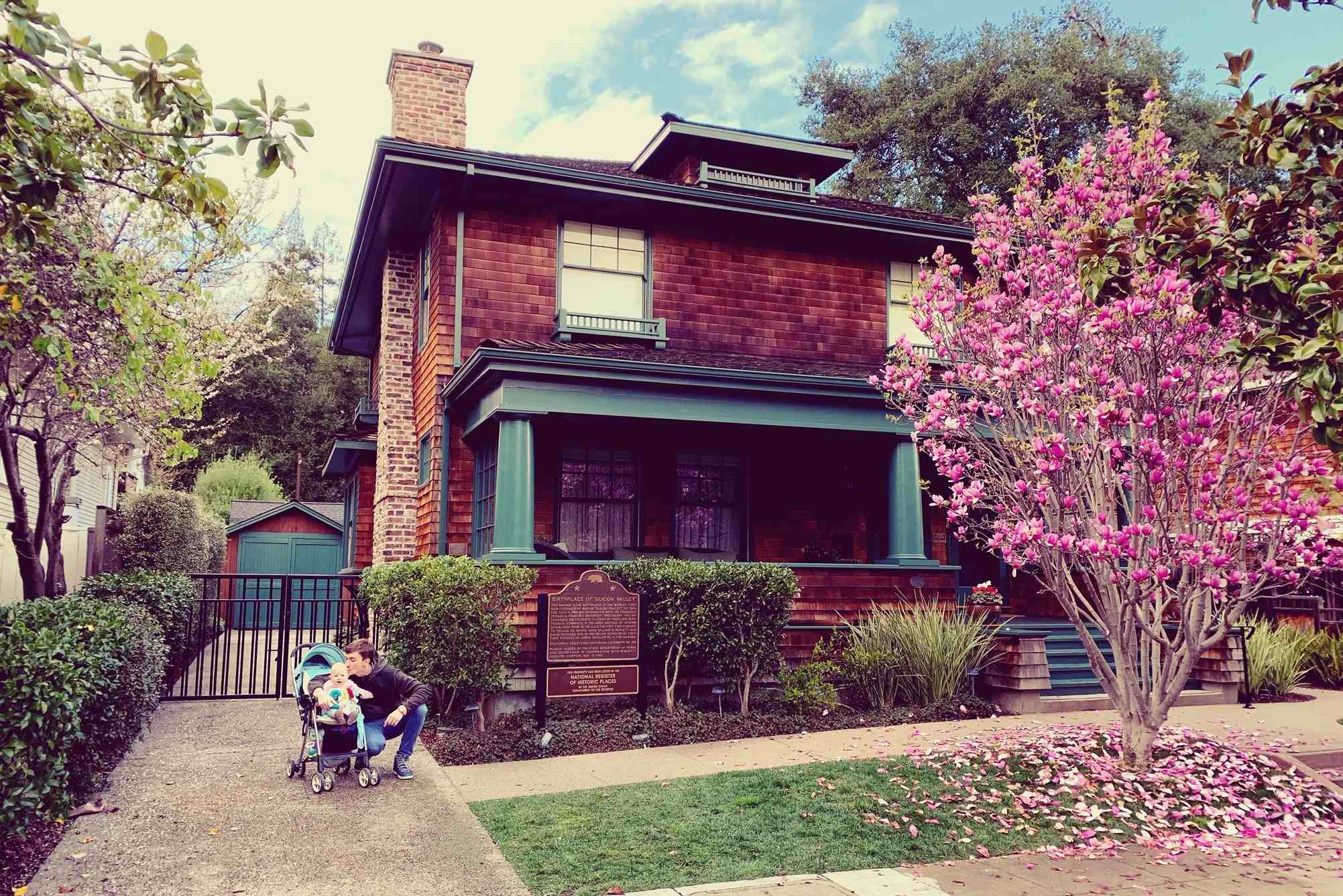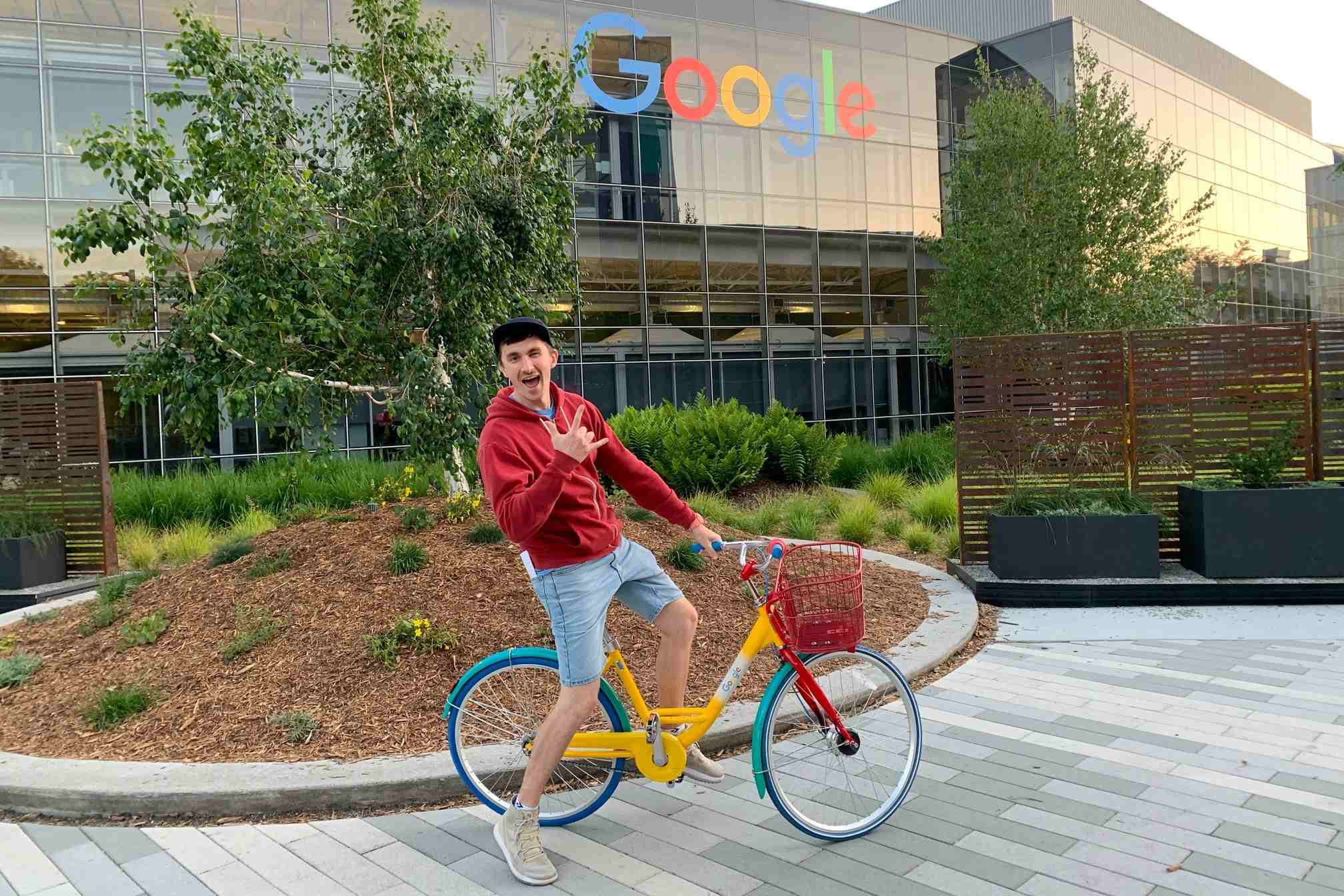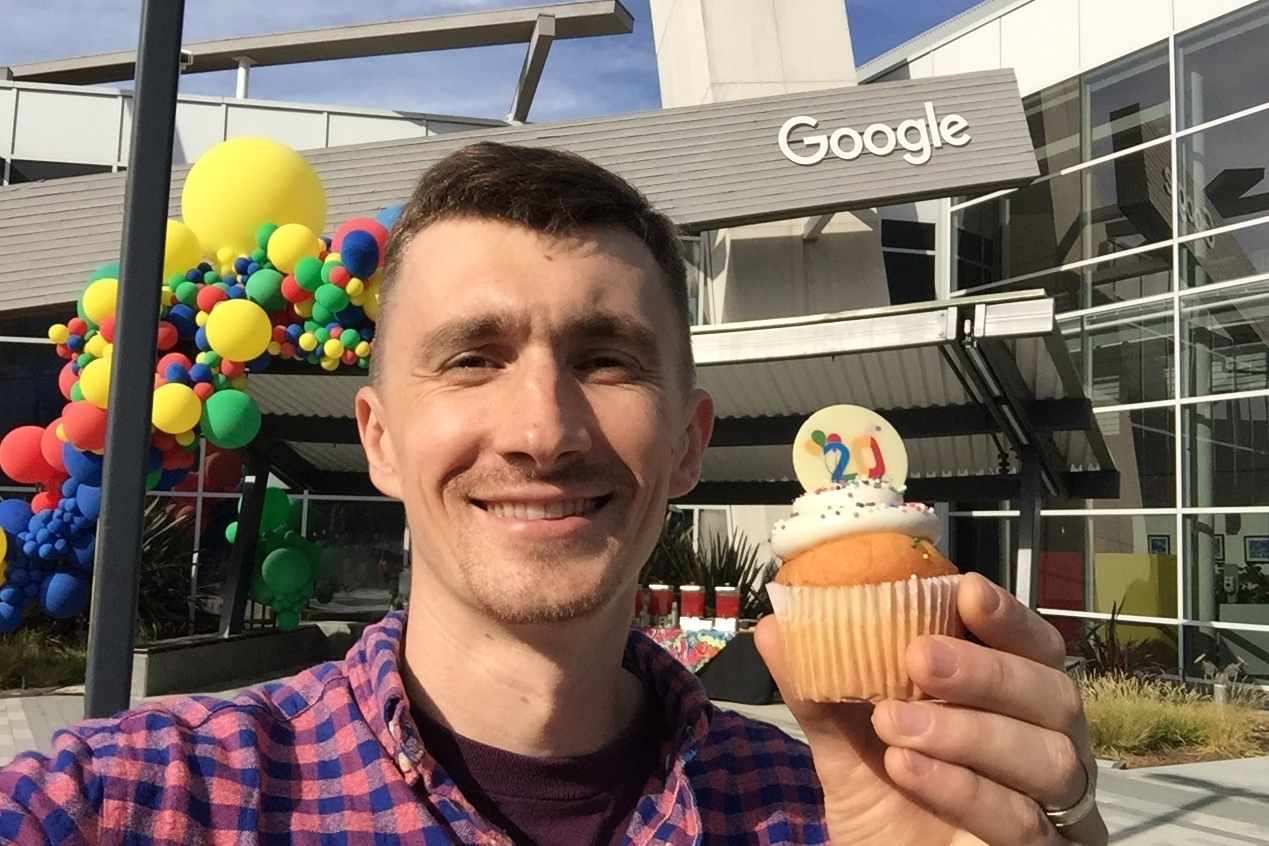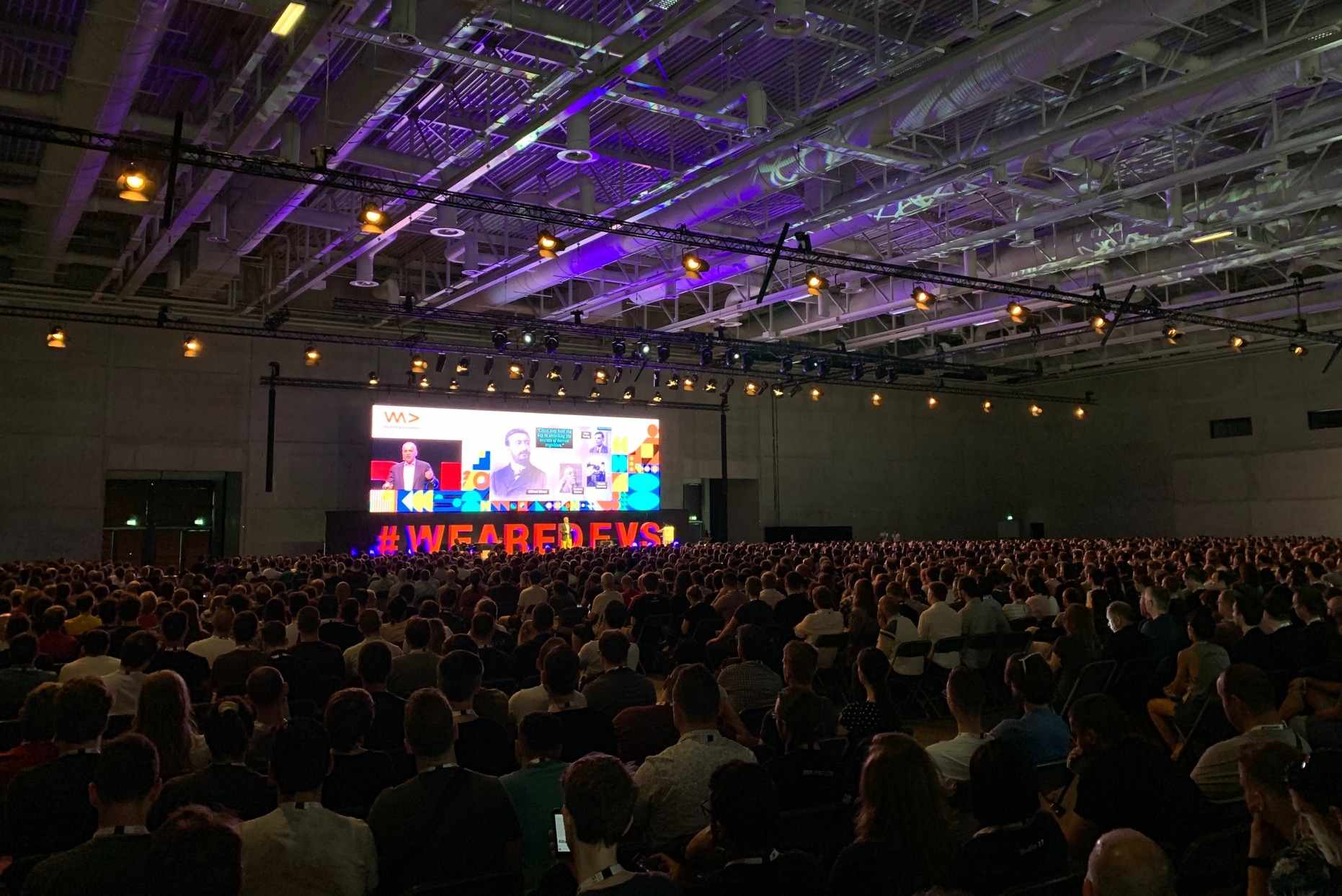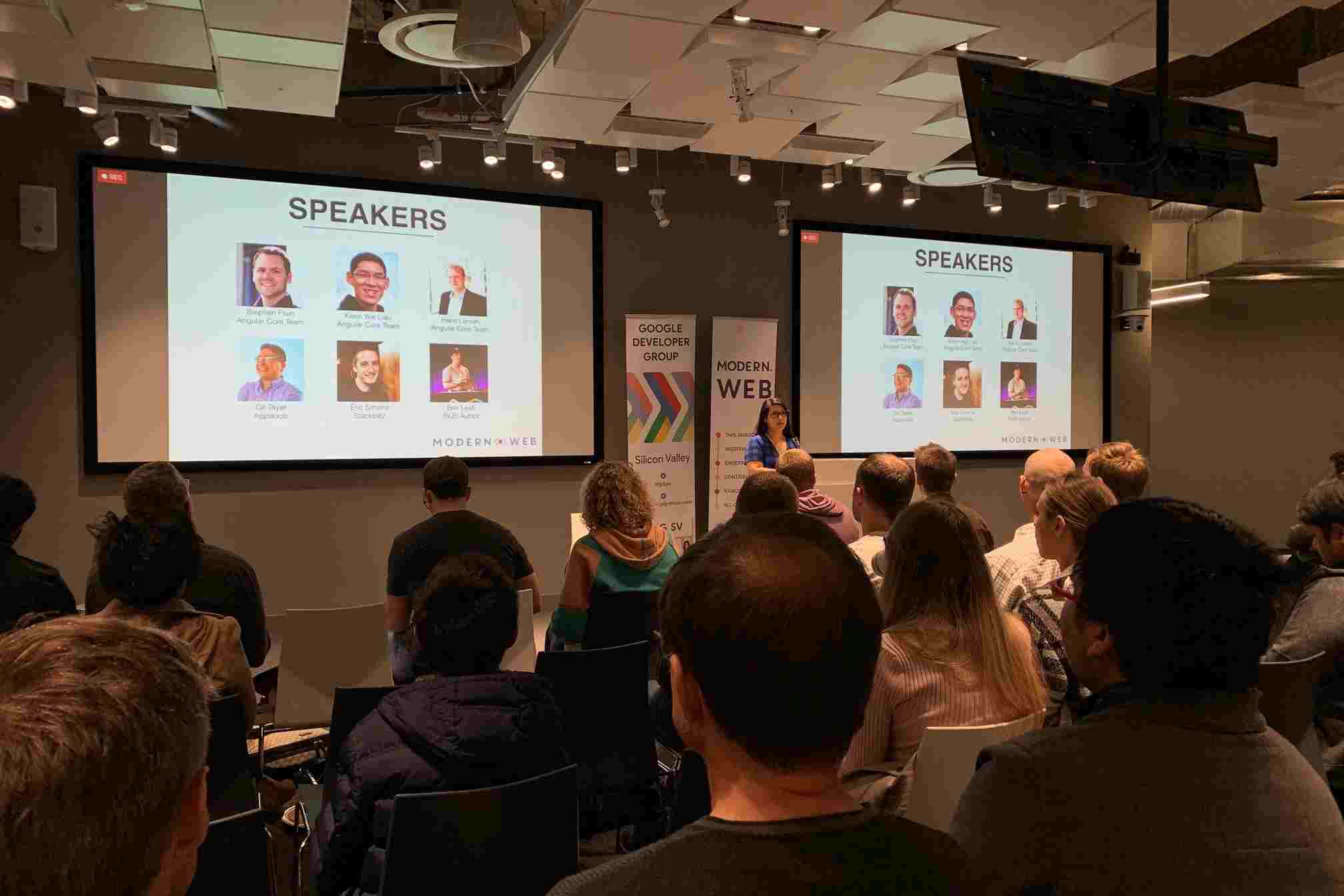Yuriy Rakovtsi is a co-founder in an American-Uzhhorod Company, Ivan Hadzheha works in his own project, Vasyl Malanka is a programmer in Berlin, Dmytro Bruso is doing his best in a small start-up working remotely and Myroslav Rak is a project leader in one of Lviv’s IT companies. These 5 IT-specialists founded and are actively promoting the Uzhhorod ІТ Community.
Actually, one can draw a map of IT areas most popular in Uzhhorod, judging by what and how all of our main characters are busy. However, we mean to tell a lot more than that, so let’s start with meeting the main driving engines of the community.
– What does it mean for you personally – Uzhhorod ІТ Community? When was the community first created?
Dmytro: It is a group of people sharing common interests. We created it to expand the circle of contacts. it first appeared on Facebook on May 29, 2014.
I remember, on that day Ivan had just come back from the States, we went for a beer. And as we chatted, we realized it was kinda sad and going for a beer just the two of us is not really exciting. Just at that time Vasyl Malanka and Anton Prokofiev were thinking in the same direction. By the way, all the people I mentioned are not from Uzhhorod.
Ivan: It is actually Yura Rakovtsi, he’s from Uzhhorod. He granted a second chance to the community thorugh educational projects that he started organizing then. But in the end, as the saying goes, there is a gran of joke in every joke. It all began with beer but for us the main thing was to communicate to colleagues and likeminded people.
As we were starting, you could say there was really no IT in Uzhhorod, and people who were doing programming were few. The boom started in 2014-2015. We thought it would be a good idea to introduce specialists to one another, communicate regularly, hold events. This way it would be more interesting for us and the use would be quite applicative.
Vasyl: for me it means a virtual environment of communication for people involved into IT. It is thru this community that I met extremely interesting people that inspired me for more active advancing and work harder.
From the very beginning Anton Prokofiev and myself, as the community founders, planned to organize something similar to Lviv IT Cluster. So we planned to make a first step, to hold an event and see if there would be interested people in Uzhhorod. And we immediately met those willing to join. I created a group on Facebook and then it came to me that first of all people needed interesting meetings and communication with colleagues. And that’s what became the whole idea for the community to exist at all.
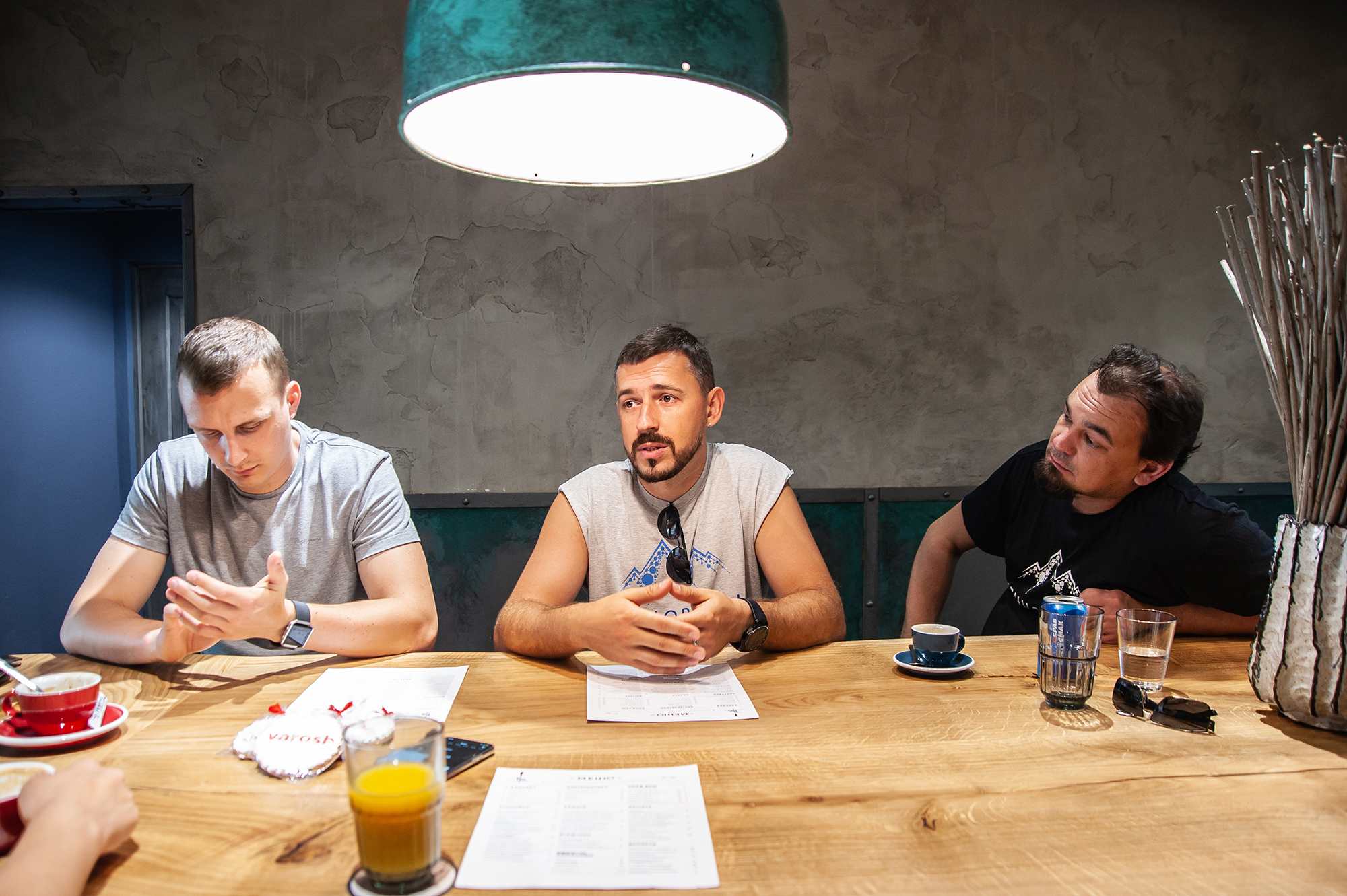
– What does each of you specialize in, in your area?
Yuriy: I am a co-founder in the company of AZinec. We registered the company in the USA in 2014 and started working actively in Uzhhorod. Now we have two offices – in Uzhorod and in Lviv and a small sale-house in Budapest. The company was founded by four Uzhhorodians – 2 classmates and 2 course mates. As for our projects, they’re mostly European and there’s an American one. No Ukrainian ones so far.
Ivan: I’ve been working in IT since 2000-ies. That was the time when IT meant just building computers. I have worked in the field since I was a student, beginning from internet providing companies, building networks, administration. And a really true IT life began in about 2010. Dmytro was then already working for Swan, so he advised me to join up. So he worked there for a long time, and then I managed to get a job at the American company Jaspersoft, they had an office in Uzhhorod. In a few years I moved to their USA office and worked there for a year. Since 2015 I decided to launch my own business. I had always been interested in game developing, for that is an IT-field where you must to be able to do everything. So now I work for myself, have flexible hours and various customers. I also develop my own products, and my single-man company is called “Borodar” (A bearded man).
Dmytro: my life has been full of changes in IT-fields – from programming to managing positions. Now I am working with a minor Swiss startup. We are solving problems in logistics and cargo freight shipment.
Vasyl: I came to IT in 2009, as I started to work as a system administrator in the Department of water resources management of Mukachevo. Then I developed an internet edition and then dived into e-commerce. Now I work in Berlin with an agency mostly designing German internet online shops.
Myroslav: in my school years in 1990-ies I was interested in maths, physics, and programming. When the time came to enter the university, I chose applied mathematics, as a speciality that seemed most close to computers and programming. And the trend caught on. By now I have been in IT for 12 years, working as a project leader in a British company that co-operates with several Ukrainian outsourcing companies.
– When did the IT field appear in Uzhhorod? Let’s remember some history.
Yuriy: All the roots of Uzhorod IT come from the company Swan, by the way still existing. They had an offspring, SysIQ, later purchased by Astound Commerce. Other offsprings were Jaspersoft, ABTO, JustAnswer.
Ivan: It was around 2010. Swan was the first company to have a huge team.
Dmytro: It was this very company that taught a very large number of people. Along with the Drobnychi family from our university.
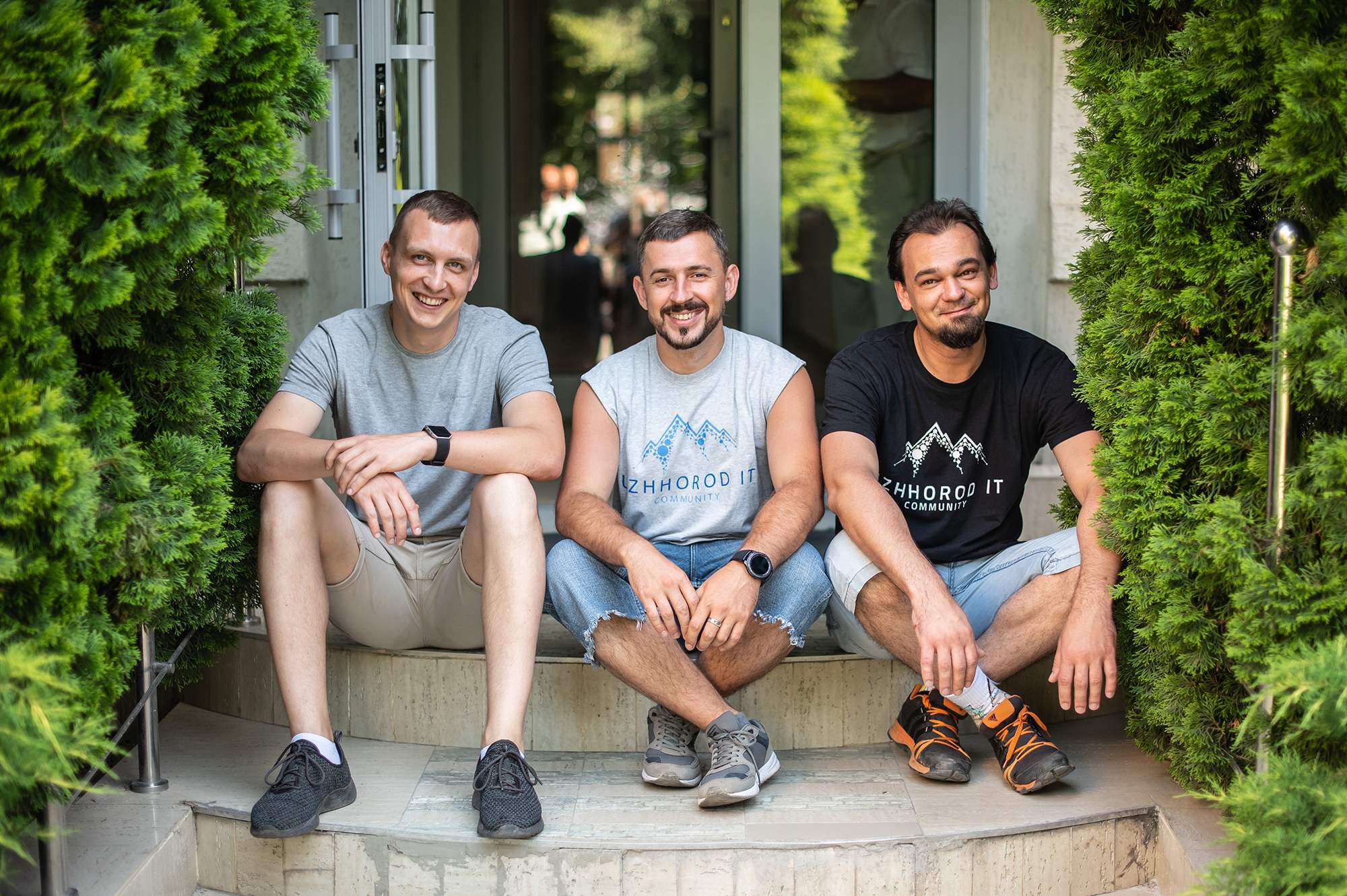
– Why do you think IT-life got a full swing in Uzhhorod at a certain moment? Do you expect to have processes similar to what was happening in Lviv?
Yuriy: To my mind, the IT-life in Lviv only seems to be lively, and in reality their companies are very closed and self-focused. In view of this, everything is more humane in Uzhhorod. We hold events not for the benefit of our own companies but to create a platform for exchanging experience, ideas. In Lviv, they do it all just for recruiting.
Ivan: Surely, to have a practical result is also important but I think we have managed to do more. People from various companies communicating as equals, experienced developers and beginners. If the city were larger, with more competition, then it might be more similar to Lviv.
– Have you tried to count how many IT guys there are in the city?
Yuriy: This is a task both easy and difficult. Generally, our community in Facebook has over 2000 subscribers but we understand that these are just interested followers that may not have anything in common with IT. But, say, there is a page for developers meetup, and they have around 750 people, and these are already real ones, visiting the events or just busy with development. So it would be logical to state that there are around 1000 people in the city involved in IT, this way or that way.
Dmytro: By the way, it is prohibited to post vacancies in our community that need relocating to other cities. We want ours to become more IT-like and not just to provide staff. If programmers start to move in a big way, then who will stay working here?
– What main achievements or important stages in IT-development of your city do you see for the latest years?
Yuriy: Whenever I start telling someone about IT in our city, first of all I mention the foundation and existence of Uzhhorod IT Community. Then I pass on to our meet-ups, visited by around 70 people on the average, which is a very good indicator. During the last two years we have held 24 events and are now preparing for a new season.
Ivan: What I would call the main stage is the offspringing of Jaspersoft, Astound and JustAnswer from Swan. It was then that our community began to form, I mean the number of developers was constantly growing.
It is important to underline that there are many more people contributing to all happening with the community than just the five of us. We are just the skeleton staff, while there are many more people in place, helping and working.
Dmytro: I would like to mark two more things that influenced the IT-development in the city. It is Google Developer Group, for due to them we have held lots of free trainings and lectures in Uzhhorod. And also the rapid development of ThinkMobiles company. They have brought up maybe half of the programmers now working in the city.
Vasyl: What is a great victory for me is the visibility of the companies. It used be that way: you had to ask friends or acquaintances to get to know about any teams working in Uzhhorod. Today, you can have the information on new vacancies, meet-ups in the offices of various companies simply by visiting the group on Mondays. Specialists began to realize how many opportunities there are in the city, and competition among companies has grown.
It is also important that Uzhhorodians have become more motivated in organizing their own events and sharing information about them through our group. Such events as Uzhhorod QA Community, STARTUP VILLAGE, Uzhhorod IT CUP are only a short list of the cool things going on in Uzhhorod now. I would like to mention especially Uzhhorod Developer Meetup – an independent group, created by the participants of Uzhhorod IT Community together with others. This is a cool platform for exchanging experience, discussing ideas and training presentational skills. I would highly recommend following their events.
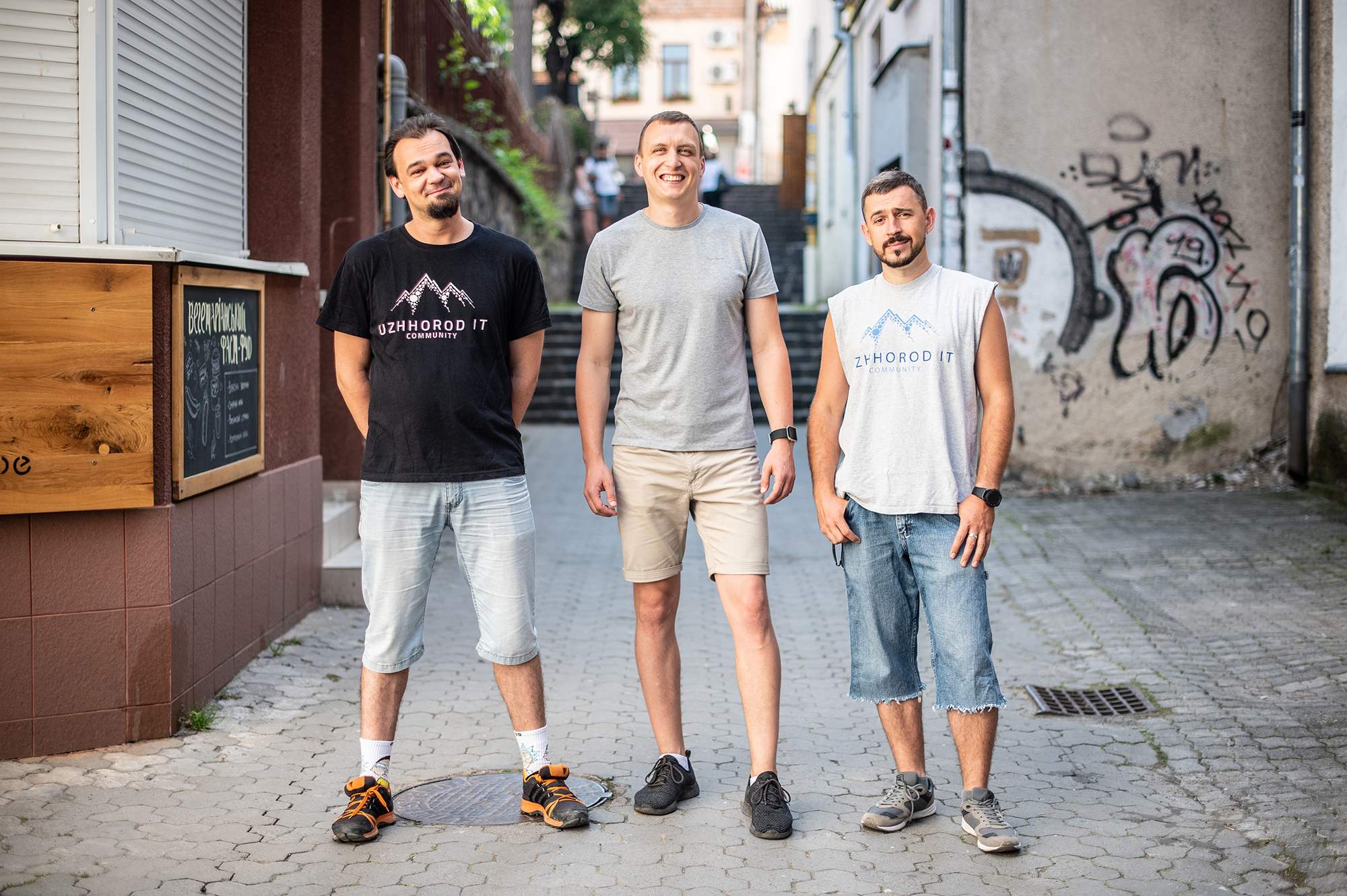
– What do you think could be improved in the life of the IT-community?
Yuriy: I think that the absence of convenient air transport ways. I had situations when the first thing that my potential partners from the USA did was to learn if we have an airport here. This is an important issue because partners and customers have to visit one another from time to time. Another proble of this area is incredibly slow borderlines. Yes, I realize that IT-guys are not important enough for the things to change. But I read your article on investments, and it seems to me that those investors also have their partners coming and they must feel the problem, too.
Myroslav: I think, the IT-community will agree: improvements in the general situation in the city would also improve the community. Specialists are leaving Uzhhorod because of extremely unsatisfactory infrastructure level and lack of work. The city is small; we cannot have too many companies. But if we had nice urban infrastructure, available locations for organizing events, decent transport communication, simple border crossing, and chances would be for people coming to us to work or even develop their business.
Vasyl: It is difficult considering this from abroad. I like the direction the Uzhhorod IT community is developing but I wish the development would go on and be more active. I also wish developers fought more for their rights, paying more attention to formal and informal agreements, requiring the companies should fulfill the conditions they promise. I remember gossiping: an ill-reputed company tried to sign unfavorable two-year contracts with junior level developers, to utilize them as much as possible. It would be cool if at such moments the city’s specialists stood together and legally defense their colleagues.
Who works in IT in Uzhhorod, at which positions, what age are they, if they work in the office or remotely or in another place; if they are happy with their job and salary? That’s how we decided to make an anonymous query among the members of Uzhhorod IT Community. So here is our portrait of an Uzhhorod IT specialis, though it may appear arbitrary.
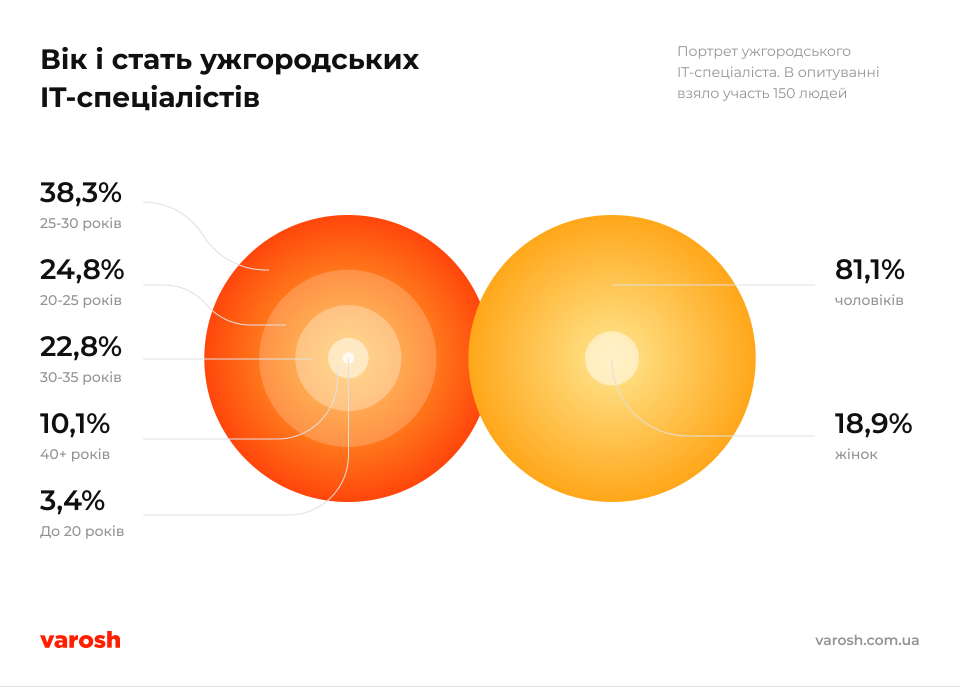
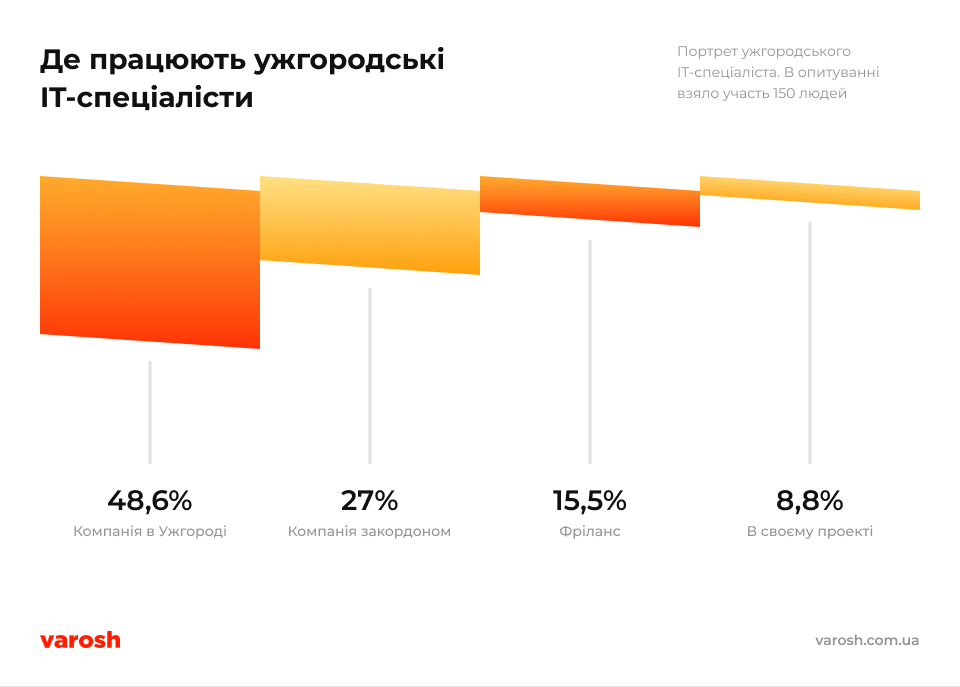
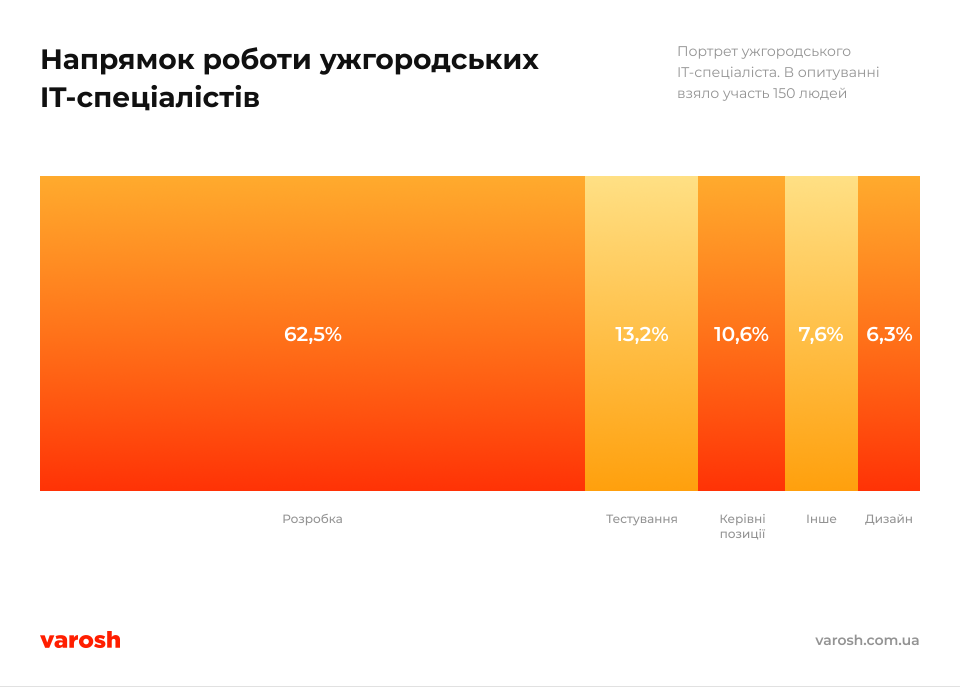
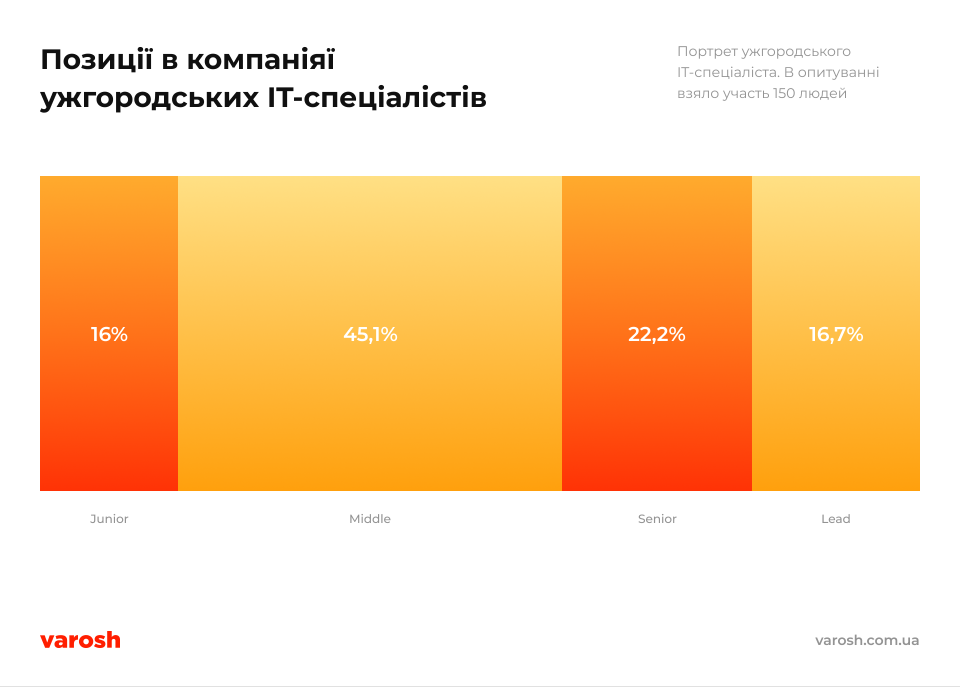
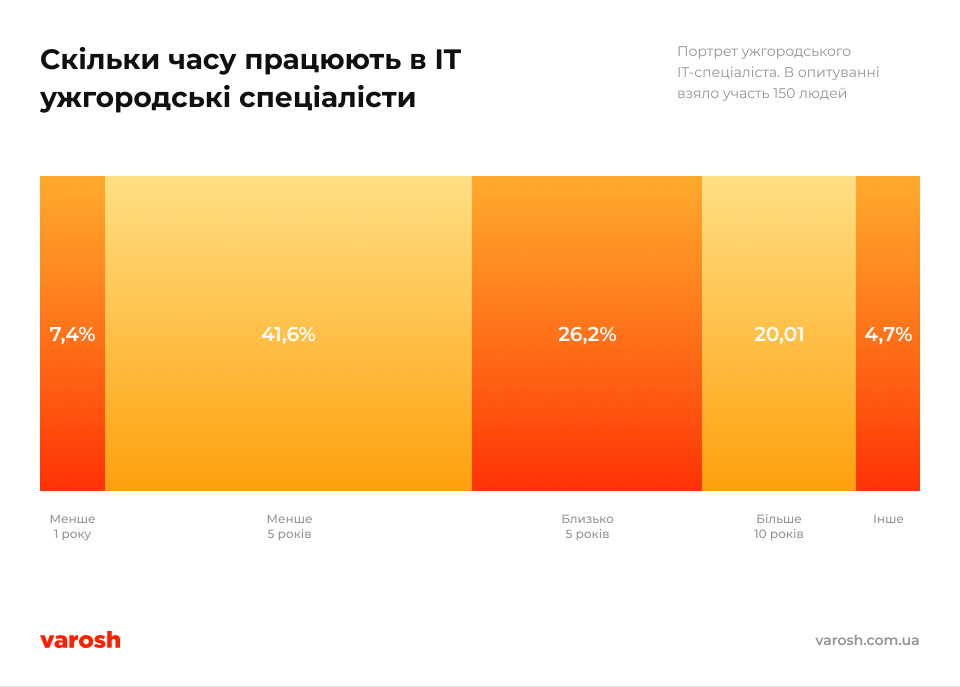
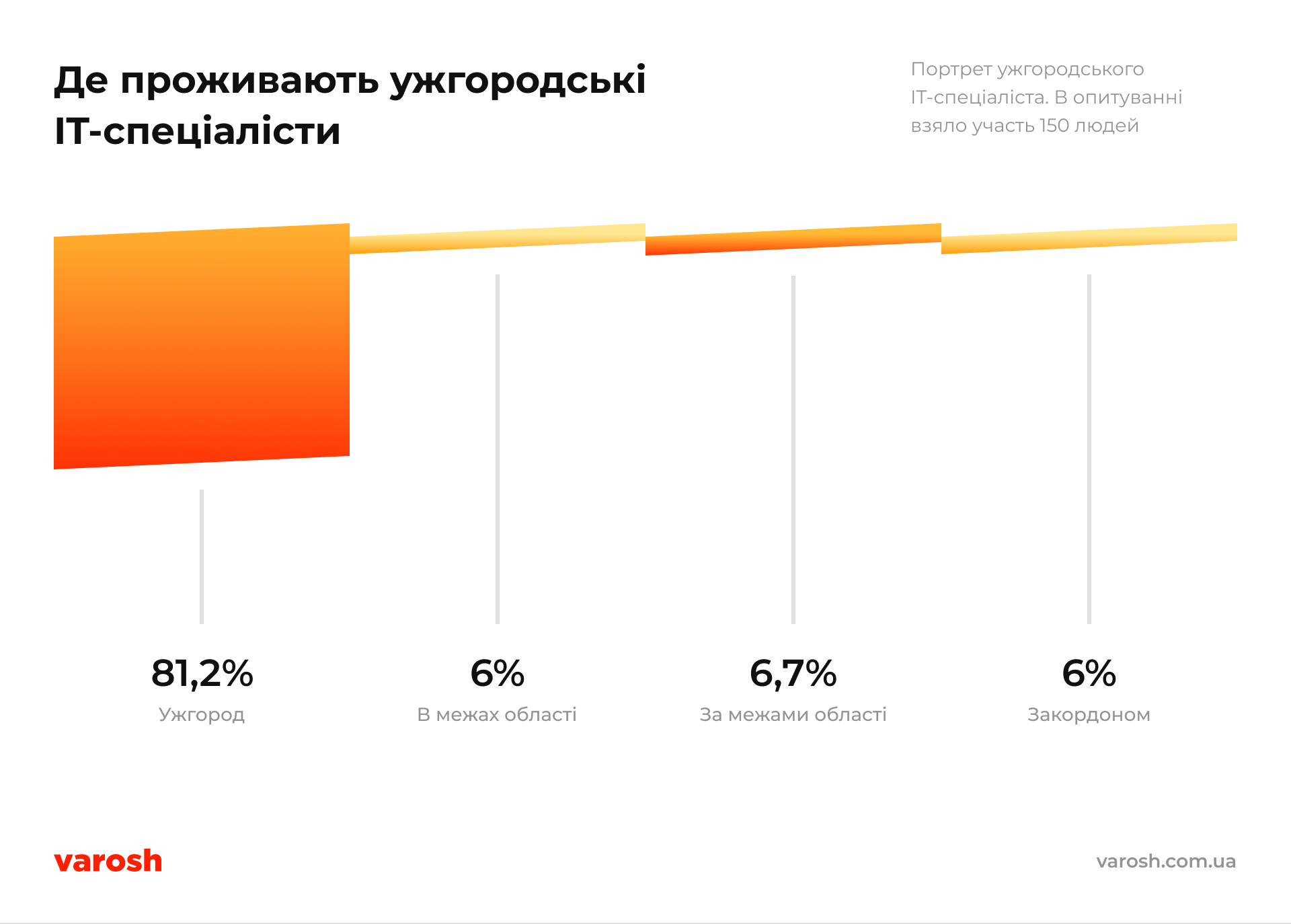
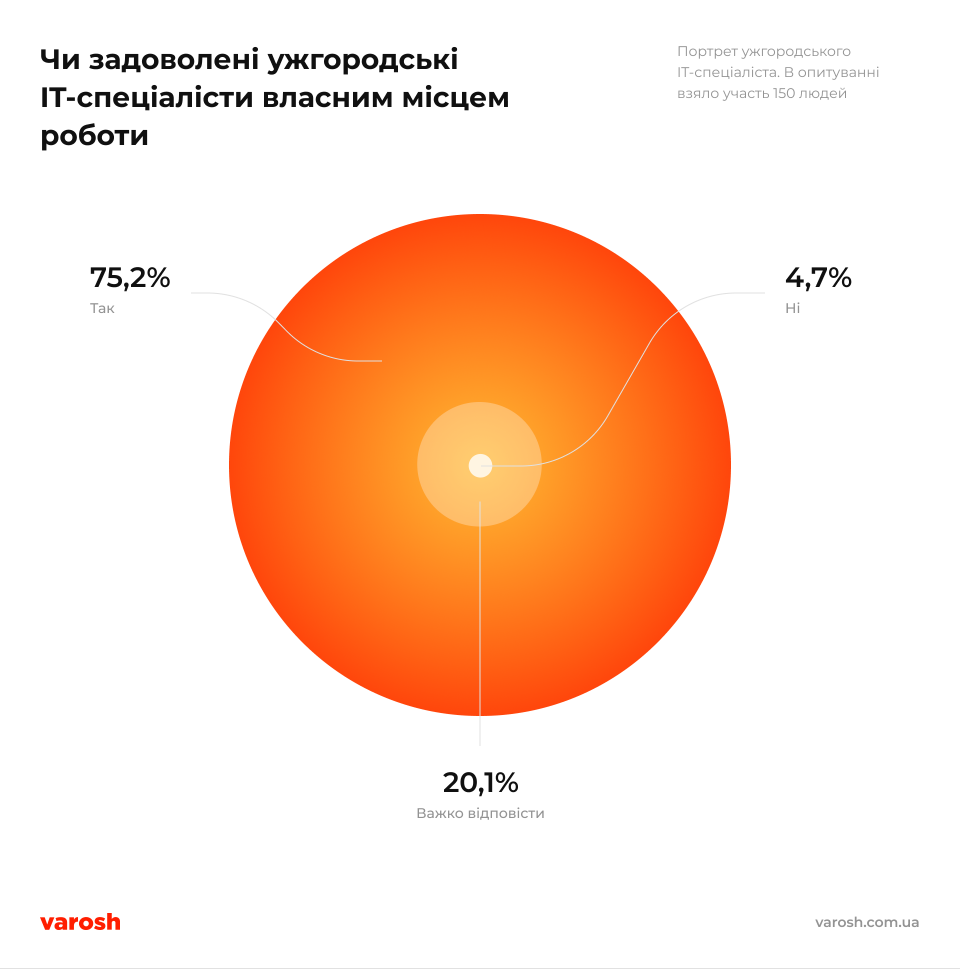
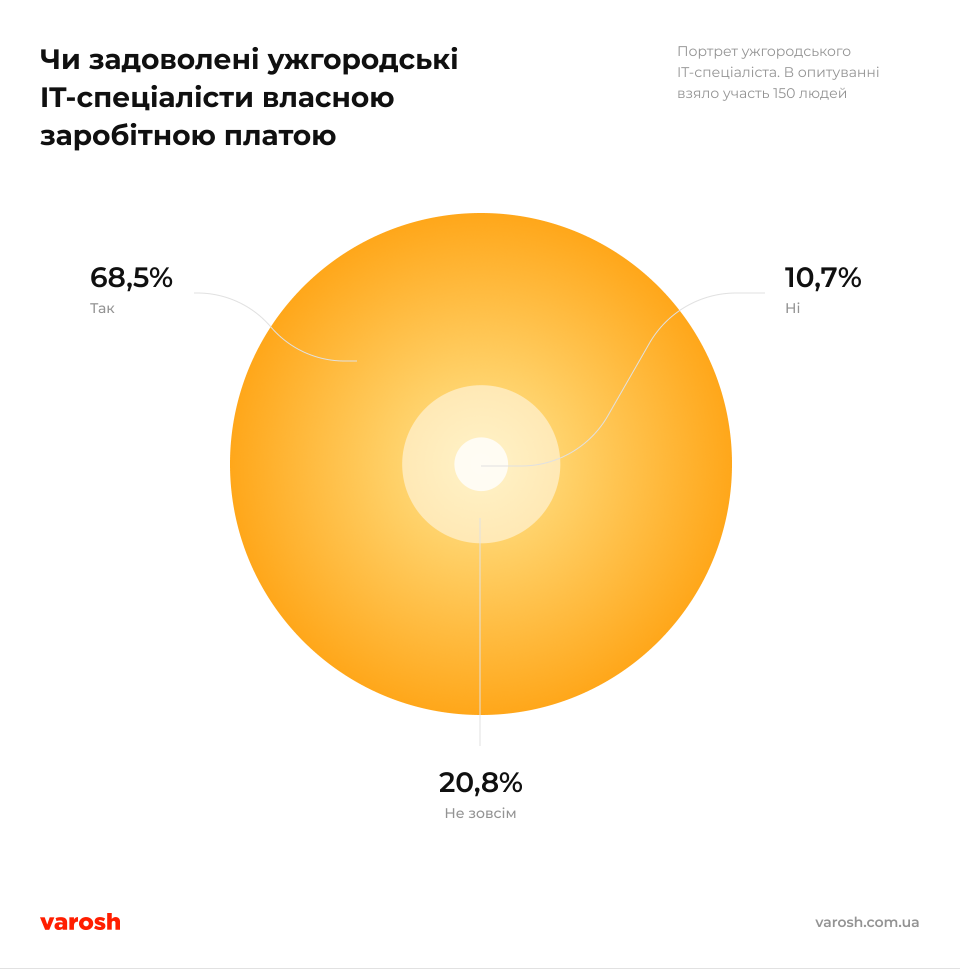
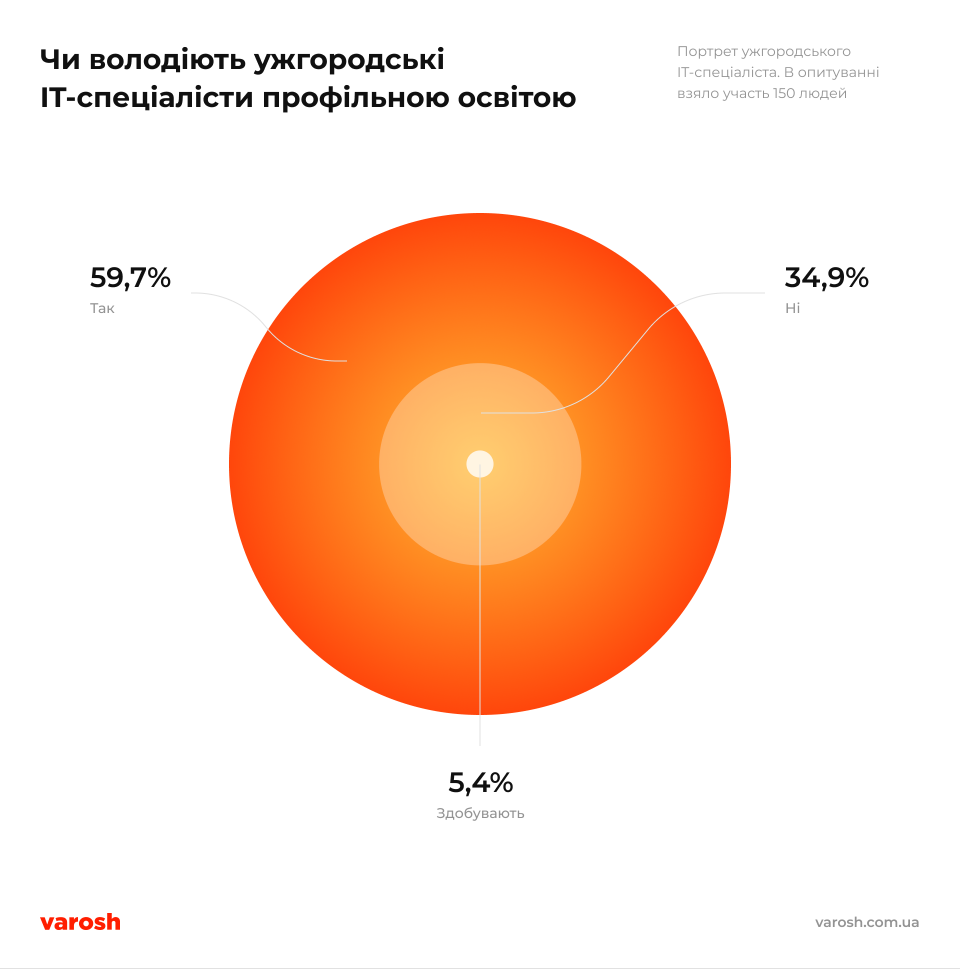
The IT-branch got actively developing in Uzhhorod in 2000-ies. Since then, that is in a 20-year’s time, over 20 companies have appeared, both smaller and larger ones. And the staff involved in the branch is over 1000 people.
The greatest companies working in Uzhhorod are the following: ThinkMobiles, Astound Commerce, PettersonApps, ABTO Software, Swan Software Solutions, Jaspersoft, White Label, BoostSolutions, AZinec. Most of them are busy with outsourcing. The customers of these companies are brends globally renowned, as well as companies well known abroad but little known to Ukrainians.
According to the information by dou.ua, salaries in the IT-segment of Uzhhorod are from 400$ to 4000$. It all depends on the position, experience and responsibilities of the developer.
The IT education fieild is also actively developing in the city. Specialist are taught by already three faculties of Uzhhorod National University: the Faculty of Inforational Technologies, Engineering and Technical Faculty and the Mathematical Faculty. Based on the university facilities, there is also an exhibition and competition event for startups, called StartUp Village.
Some companies have their own educational programs for potential team members. In particular, GURU IT School by ThinkMobiles. And the regular Boot Camp by Astound Commerce. Both of the schools, best students are invited to the company team.
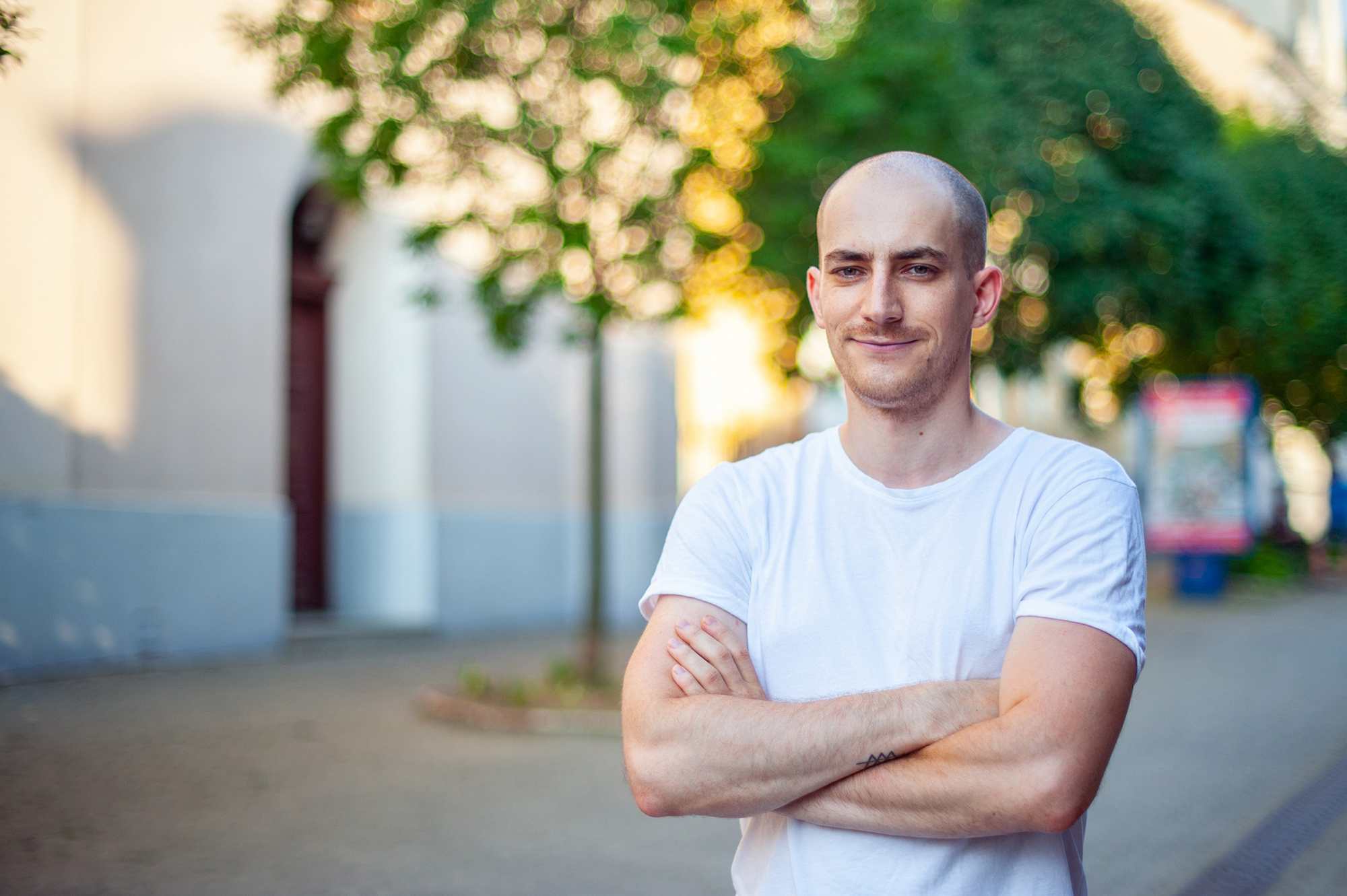
Dominik Levitskiy has created a product for designers, under the name FontBase. It is considered a success not only in Uzhhorod but worldwide. It is proved by the download geography. FontBase can search for fonts by individual parameters, including contrast, height, weight, width and proportions.
Dominik tells us about the software and in what ways it is better than the previous ones developed before his appeared.
Just like many designers, I have collected a whole lot of fonts throughout many years of experience. I started searching for a solution to systemize them. I found a font manager. I installed some and, frankly speaking, was unhappily surprised: all of them were not user-friendly and they all missed some features. Moreover, I didn’t like their interface, none of them. I like nice things, convenient in use. So I decided to use my programming and design knowledge and in a six-month’s time I did it.
Then I tested the software for a month and realized that I could make a release. I created a page on Facebook, a Twitter account, a site – and gave it to people. To have a vision of whether it will be interesting to people, I did an e-mail distribution and was surprised: quite soon I got subscribed. In a month I had 200 subscribers.
The software had been living its own life for a year while I was busy in other projects. But subsequently I decided to update everything and realized I wouldn’t do it physically by myself. So I found a colleague through Uzhhorod IT Community, and he has been working on the project since then until now. We have updated everything and the project found a new lease of life.
Now there is an option to have a commercial subscription at 3 dollars monthly or 29 dollars yearly. Currently there are already 2700 commercial subscriptions. The greatest number of users are from Brazil, followe by the USA and Germany.
Now chances are for FontBase to become a nice business case. We are already ahead of our competitors with the feature of constant updating. We have many options not available in other software products, and others are in a single place. You don’t have to download several applications to do a single task.

Yevhen Andrykanych is advocating his own vision of advancing in IT. To the programmer’s mind, the best working option is a total freelance. He tells us about it, while also teaching development, through his own YouTube channel, “A freelancer for life”.
In the IT community freelance is still given a hostile reception. No wonder, since about 95% of IT pro’s work for companies. And when you come telling everything could be different, including the channel “A freelancer for life”, the usual human properties are shown. But the situation is slowly changing, both in the world and at the local level. Freelancers get more orders and and people stop seeing them as lazybones wearing gumshoes.
I met Uzhhorod IT Community thanks to their event, Developers meetup. It was then that the idea appeared to share knowledge and I decided to have a speech in public, in front of the IT community. It was then that I also met very interesting and talented boys and girls. I still maintain contacts with them. But I want more action, more helter-skelter. Both in respect of offline events and in the group.
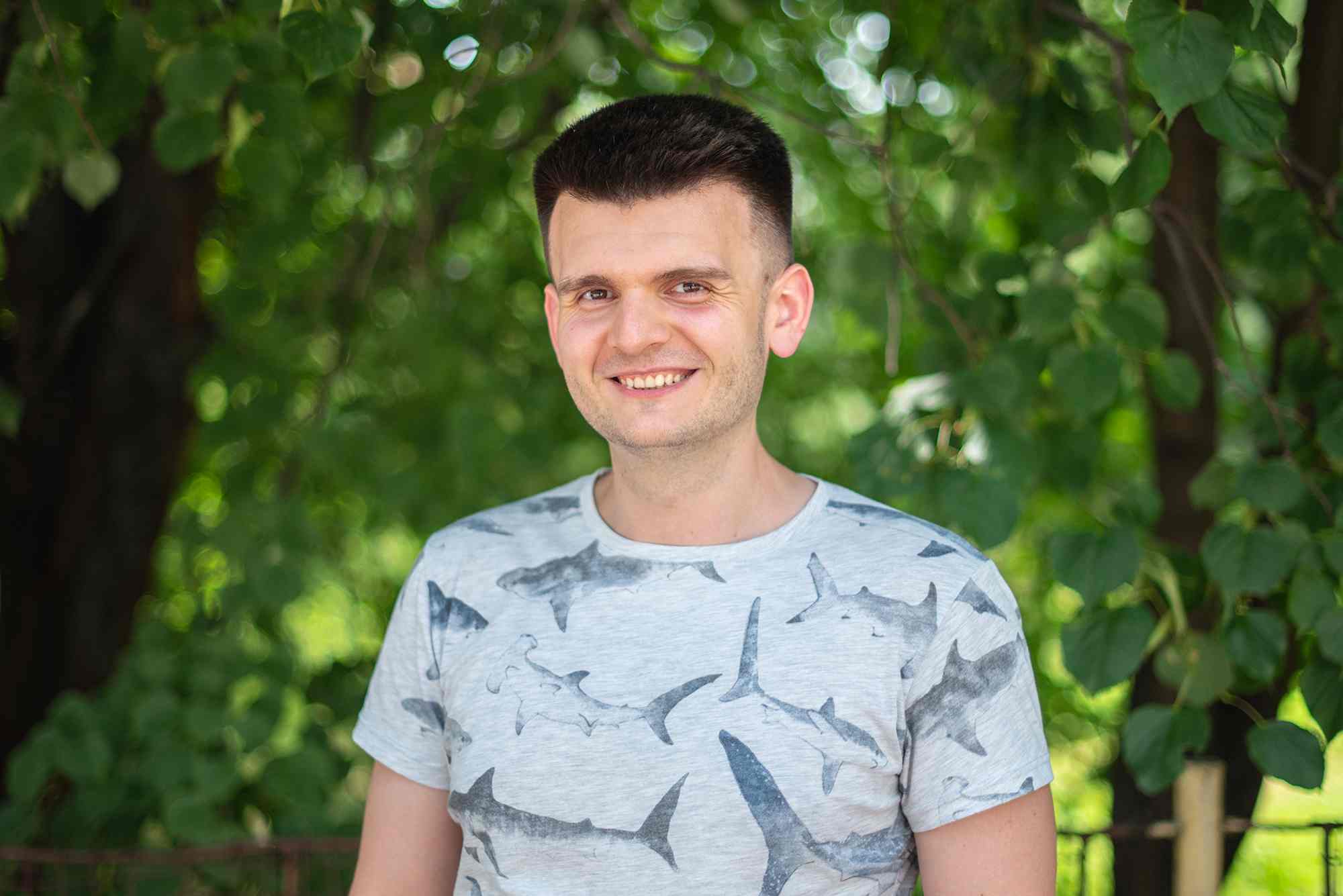
Pavlo Daniliuk is the so-called voice of millenials. He’s following his goals slowly, making mistakes and stopping catching breath for various activities. The guy does not want work for anybody else and is willing to develop his own projects. He has recently presented one of them, and not without luck. The software Three.do helping plan all of your affairs and complete them in time, has been downloaded by over 10K people, and 250 of them have purchased the commercial version. It is, by the way, not so cheap, at 13 $. The major part of purchases is from Norway.

Three.do is a software for reminds liked by most users. I put a higher price than at most applications of the kind but still people buy it. Others cost 3-4 dollars, while mine costs 13. A user even purchased a sponsorship package at 300 dollars.
The application is special for the following feature. The task can be created in a few seconds and you don’t have to write any key words or sentences. You just enter it via context elements. Setting of objectives takes 3 seconds.
The main feature is the minimalism. The software does not make you think over complicated sentences.
Three.do has been downloaded by about 10K people. Only the first few weeks of distribution brought about 6K people. Once the application was mentioned by a Norwegian journal, and during the night the software had about 1000 users.
I earned 1000 dollars during the first 2 weeks but now I am only getting about 100 dollars per month. This is the so-called valley of death in startups. It must be survived, since in the end it may get explosive growth or fade out completely.
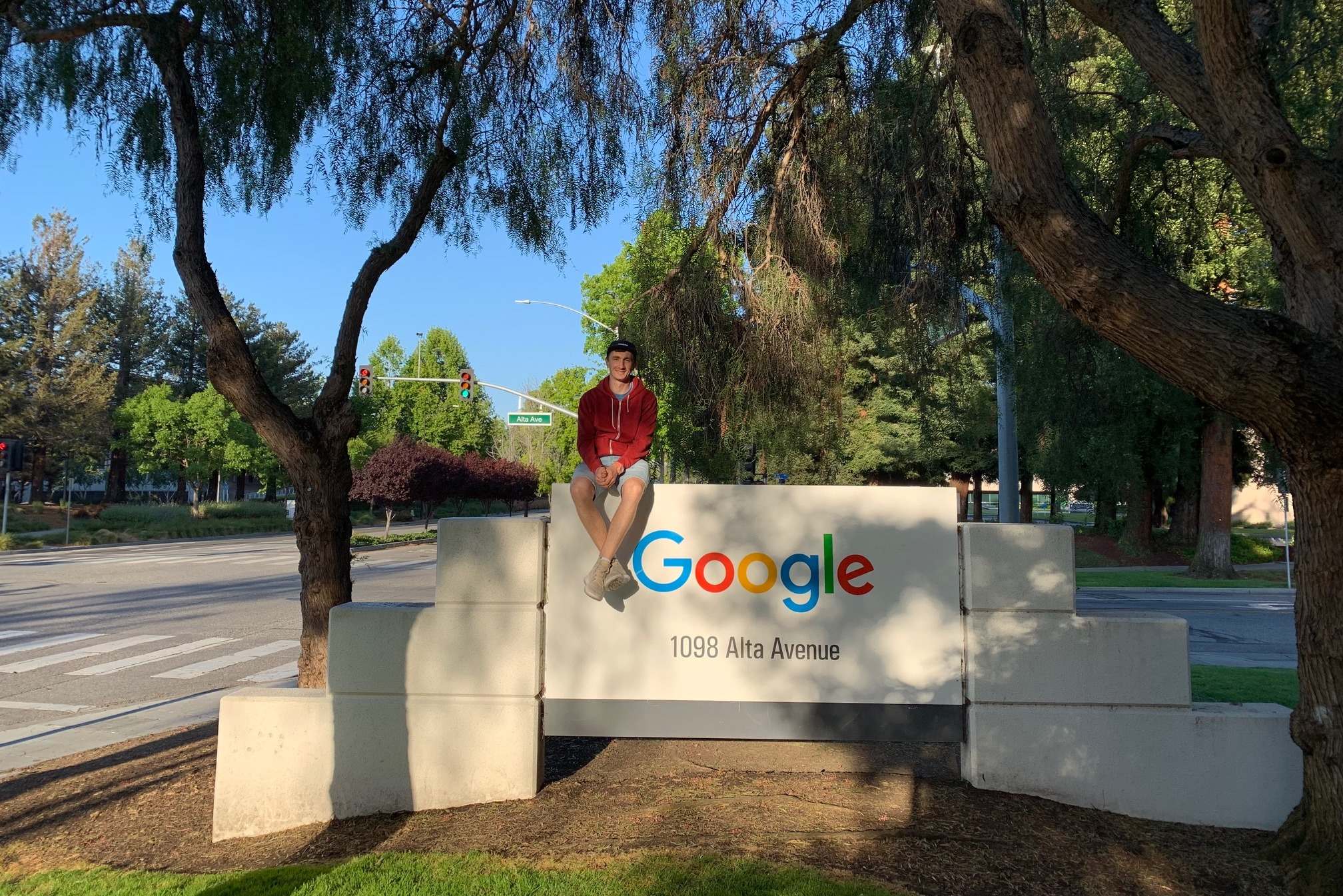
Pavlo Genov lived in the USA for a year, working for Grid Dynamics. The job included working at the customer’s site. The company was Google, and the site – the Silicon Valley. The developer’s position was Senior Software Engineer (UI). We are communicating with Pavlo soon after he moved to Vrotslav.
Since last September I started working for the American IT company, Grid Dynamics. They also have their offices in Ukraine. The project I joined envisaged working on the customer’s site, which is Google in the Silicon Valley. So we went there with my family. Before that, we had been to the USA with my wife, visiting friends. And we noticed that we would like to live there for half a year or a year, to compare the American way of life to the European one. That was a fantastic, wonderful opportunity, in the respect of working and life experience.
I still work for Grid Dynamics at the position of Senior Software Engineer (UI), advancing the same project I started in the USA. But now it is Google’s office in Wroclaw. My job includes designing and development of high-effiiciency web applications for business. That involves collecting and defining requirements to the project, discussing the realization with the team, designing of models and prototypes at the concept stage, designing product architecture and actually the code writing and testing, reviewing with further compiling of supplementaty documentation.
It was interesting for my wife and me to live in America and see the difference between the Americans’ everyday life and that of Europeans. The main difference is the balance between work and the personal life. In the USA it is clearly inclined to the work side. But if you’re fond of it and strive for learning and show up, you will find enough opportunity to apply your potential and ambitions on any scale. I was often visiting meet-ups devoted to technologies I am interested in. Such events are usually free to enter and are often held in the offices of large companies (Google, Uber, Twitter, Coinbase). I used to easily meet people creating and developing the technologies I use in everyday work; so I got inspired and get ideas. Those people are working at the realization of absolutely fantastic ideas, and there is an opportunity to get involved.
Meanwhile in Europe, generally the balance is rather for the good of the personal and family life: paid holidays are twice as long on the average, additional days are allotted for child care, high-quality free kindergartens and schools, relatively cheap higher education, free or cheap medical treatment.
Also, Europe’s relatively moderate size allows for opportunity to travel to neighboring country even every week-end, if you want to. In the USA, on the contrary, you will not manage to have a week-end in Vienna, Paris or Lissabon. But due to the picturesque nature, various climate and a great number of public parks, the active rest, outdoor activitiesa arevery popular: hiking, serfing, skiing and snowboarding, baseball, basketball, golf, cycling, rock climbing and others. Yet I never stop wondering: a popular activity during the week-end, both among young people and elderly ones is still watching fils and serials, eating popcorn.
What I liked in everyday life in California was the prohibition of smoking and alcohol drinking in public places. It seemed that we never sniffed tobacco odor for a single time during the 8-month’s time, and you get used to it quickly. On the contrary, in Europe this is the first thing you notice as you exit the airport.
Also, an essential difference is that you feel at home in the USA right on the next day after you arrive. This is a country of emigrants, so the culture has formed in such a way that you will be received equally, regardless of your clothes, nationality, and color of the skin and the level of English, status, citizenship and so on. Maybe when there are people of various cultures around, you don’t stand out in a crowd.
For me, the IT community in Uzhhorod means my friends that I worked with for different companies in the last ten years. We meet regularly at IT conferences in Ukraine and Europe. It was just a few weeks ago that we came back from the congress WeAreDevelopers, in Berlin.
It seems to me that such features as the historical downtown with a river, the Transcarpathian nature, the location close to the border, a small distance from the bigger airports – all of these make Uzhhorod a potentially attractive place for further IT advancing. At the same time, a very poorly developed infrastructure, the awful roads and public places, the absence of children’s grounds and comfortable transport communication with other cities in Ukraine and Europe, constant waiting in queues at the borderline – these are all forcible arguments doing real harm to the city’s potential.
Disclaimer: the present material is presented by the civic community of “Institute of Central European Strategy” with the support by US Agency for International Development (USAID). Creating the material became possible with sincere support from the American people as provided via US Agency for International Development (USAID). The contents or the material is a sole responsibility of the civic community of “Institute of Central European Strategy” and does not necessarily reflect opinion of USAID or USA government. Reproduction and use of any part of this material in any format, including graphical, electronic, copying or using in any other way whatsoever is prohibited without a link to the original source.
